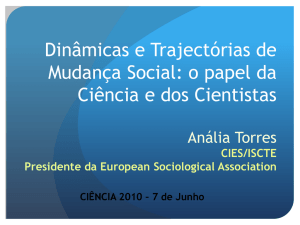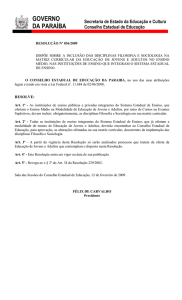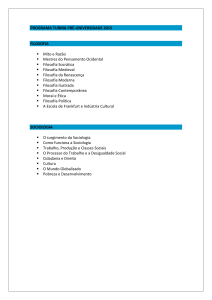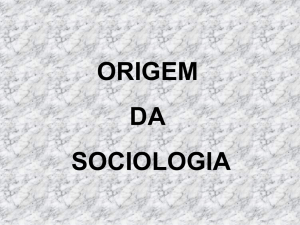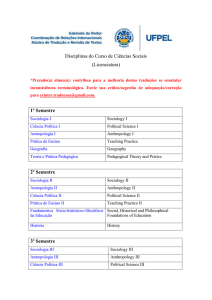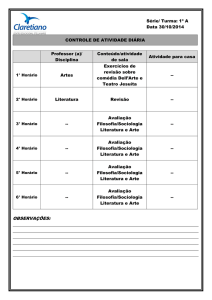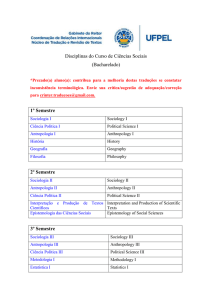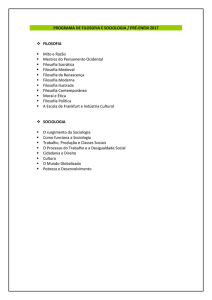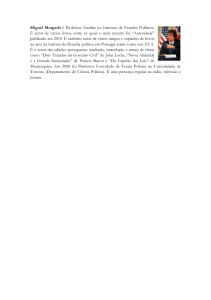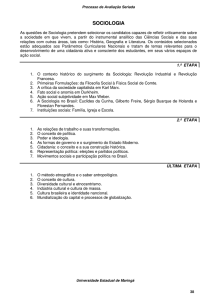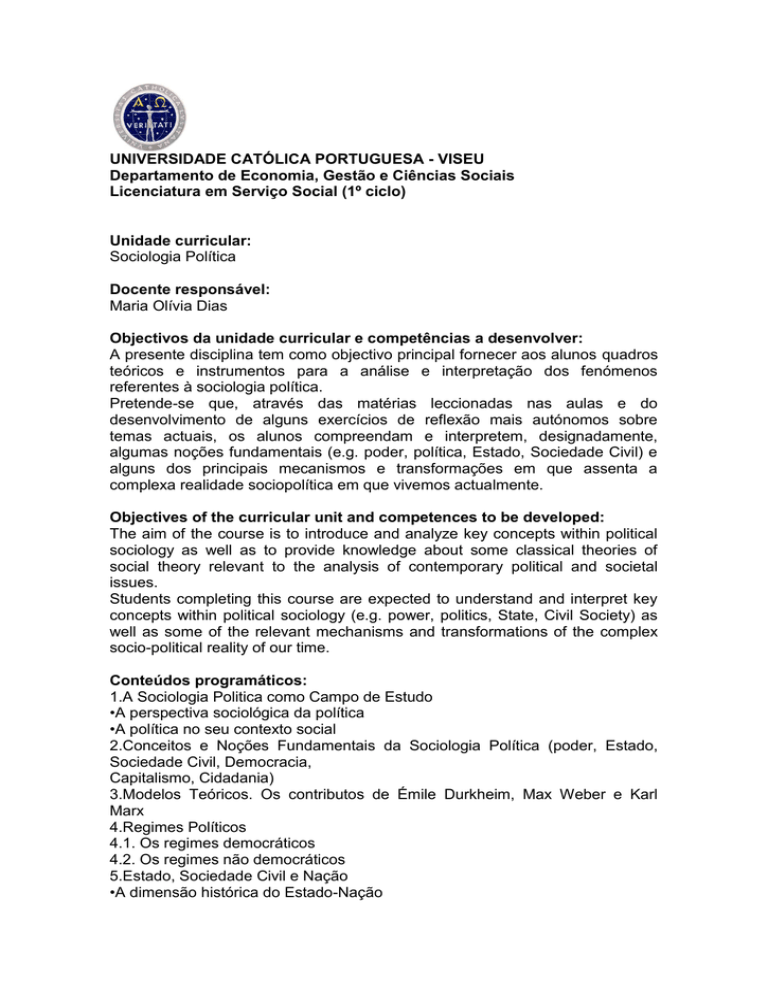
UNIVERSIDADE CATÓLICA PORTUGUESA - VISEU
Departamento de Economia, Gestão e Ciências Sociais
Licenciatura em Serviço Social (1º ciclo)
Unidade curricular:
Sociologia Política
Docente responsável:
Maria Olívia Dias
Objectivos da unidade curricular e competências a desenvolver:
A presente disciplina tem como objectivo principal fornecer aos alunos quadros
teóricos e instrumentos para a análise e interpretação dos fenómenos
referentes à sociologia política.
Pretende-se que, através das matérias leccionadas nas aulas e do
desenvolvimento de alguns exercícios de reflexão mais autónomos sobre
temas actuais, os alunos compreendam e interpretem, designadamente,
algumas noções fundamentais (e.g. poder, política, Estado, Sociedade Civil) e
alguns dos principais mecanismos e transformações em que assenta a
complexa realidade sociopolítica em que vivemos actualmente.
Objectives of the curricular unit and competences to be developed:
The aim of the course is to introduce and analyze key concepts within political
sociology as well as to provide knowledge about some classical theories of
social theory relevant to the analysis of contemporary political and societal
issues.
Students completing this course are expected to understand and interpret key
concepts within political sociology (e.g. power, politics, State, Civil Society) as
well as some of the relevant mechanisms and transformations of the complex
socio-political reality of our time.
Conteúdos programáticos:
1.A Sociologia Politica como Campo de Estudo
•A perspectiva sociológica da política
•A política no seu contexto social
2.Conceitos e Noções Fundamentais da Sociologia Política (poder, Estado,
Sociedade Civil, Democracia,
Capitalismo, Cidadania)
3.Modelos Teóricos. Os contributos de Émile Durkheim, Max Weber e Karl
Marx
4.Regimes Políticos
4.1. Os regimes democráticos
4.2. Os regimes não democráticos
5.Estado, Sociedade Civil e Nação
•A dimensão histórica do Estado-Nação
•A relação Estado-Sociedade Civil
•A crise do Estado-Nação: os desafios da globalização
Syllabus:
1. Political Sociology as a field of study
•Sociological perspective of politics
•Politics within its social context
2.Key concepts within Political Sociology (power, state, civil society, democracy,
capitalism, citizenship)
3.Classical theories. The theoretical perspectives of Émile Durkheim, Max
Weber and Karl Marx
4.Political regimes.
4.1. Democratic Regimes
4.2. Non Democratic Regimes
5.State, Civil Society and the Nation-State
•The historical dimension of the Nation State
•The state’s relationship with civil society
•The crisis of the Nation State. The challenges of globalization
Demonstração da coerência dos conteúdos programáticos com os
objectivos da unidade curricular:
O enquadramento teórico inicial sobre o objecto de estudo e o desenvolvimento
da Sociologia Política deverá permitir aos estudantes compreender os
objectivos e as especificidades da análise sociológica dos fenómenos do poder
e da política.
A análise e reflexão em torno de alguns conceitos centrais (e.g. poder, política,
Estado, Estado-Nação, Sociedade Civil) e de algumas perspectivas teóricas
visa familiarizar os alunos e levá-los a reflectir sobre alguns temas políticos e
sociais actuais. A abordagem de alguns debates e perspectivas teóricas
contemporâneas em torno, designadamente, da relação entre Estado e
Sociedade Civil e das mudanças que têm vindo a afectar o papel do
Estado(Nação) complementa este objectivo.
Demonstration of the syllabus coherence with the curricular unit's
objectives:
The first lectures aim at familiarizing students with the knowledge of Political
Sociology as a field of study, its object of analysis and the specificity of the
sociological perspective of politics and power.
The introduction and analysis of key concepts and theoretical perspectives
within Political Sociology is expected to instruct them and make them think
imaginatively about contemporary political and societal issues. This goal will be
achieved also by examining some contemporary theories and debates related,
namely, to the relationship between Civil Society and the State as well as some
of the challenges affecting the role of the (Nation) State.
Metodologias de ensino (avaliação incluída):
A cadeira funcionará na base de aulas teórico-práticas, repartindo-se os seus
objectivos pedagógicos pela
leccionação das dimensões teóricas e instrumentos de análise da Sociologia
Política e pela promoção da
participação dos estudantes na discussão e análise de ideias, tendo como base
os textos da disciplina.
Dois componentes de avaliação:
(1) Participação activa nas aulas e discussão de um artigo científico – 40%;
(2) Dois testes escritos – 60%.
Teaching methodologies (including evaluation):
The course consists of theoretical-practical lectures. These include the
explanation and analysis of theoretical concepts and perspectives combined
with a more practical component that derives from the reading of texts critically
and analytically by the students.
Two components of evaluation:
(1) Active participation and discussion of a scientific article – 40%;
(2) Two written tests – 60%.
Demonstração da coerência das metodologias de ensino com os
objectivos da unidade curricular.
O programa visa familiarizar os alunos com alguns conceitos fundamentais e
perspectivas teóricas da sociologia política e alguns dos debates
contemporâneos no âmbito da disciplina. Pretende-se, designadamente, que os
estudantes conheçam diferentes abordagens teóricas relacionadas com o
estudo do poder, das instituições e/ou organizações políticas e do papel do
Estado.
O modo como o programa está organizado visa promover o pensamento crítico
e a capacidade de os estudantes exprimirem as suas próprias opiniões.
Espera-se também que estes adquiram as competências necessárias para a
análise de textos científicos e que sejam capazes de construir e desconstruir
argumentos.
Demonstration of the teaching methodologies coherence with the
curricular unit’s objectives.
The aim of the course is, namely, to familiarize students with some fundamental
concepts and theoretical
perspectives in the domain of Political Sociology as well as with its
contemporary debates. It will allow students to understand different theoretical
approaches to the study of power, political institutions and/or organizations and
the role of the state.
The course program is designed in such a way as to enhance students’
capacity of critical thinking and ability to express their own opinions. It is
expected also that they acquired the skills of reading texts critically and
analytically, and the ‘arts’ of constructing and de-constructing conceptions and
arguments.
Bibliografia principal:
BENEDICTO, Jorge; MORÁN, Maria Luz (1995), Sociedade Y Política. Temas
de Sociologia Política, Madrid: Alianza Editorial.
BAUDOUIN, Jean (2000), Introdução à Sociologia Política, Lisboa, Editorial
Estampa.
CABRAL, M. Villaverde (1997), Cidadania Política e Equidade Social em
Portugal. Oeiras: Celta Editora.
COLAS, Dominique (s.d.), Sociologia Política, Porto: Rés-Editora.
CRUZ, Manuel Braga da (1993), Teoria Sociológicas. Os Fundadores e os
Clássicos. Lisboa: Fundação Calouste Gulbenkian.
SCHWARTZENBERG, Roger-Gérard (1998), Sociologie Politique. Paris :
Montchrestien.

